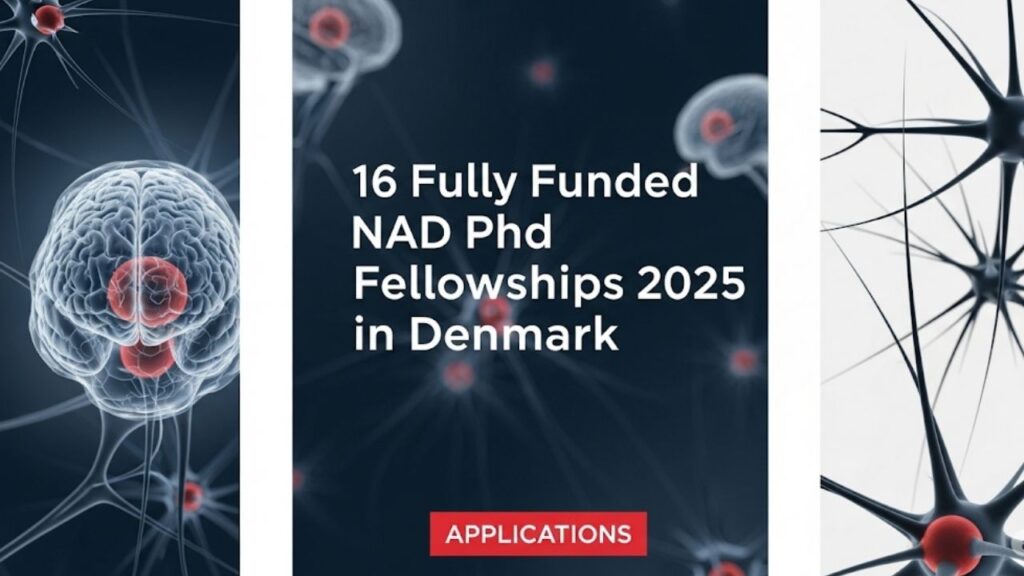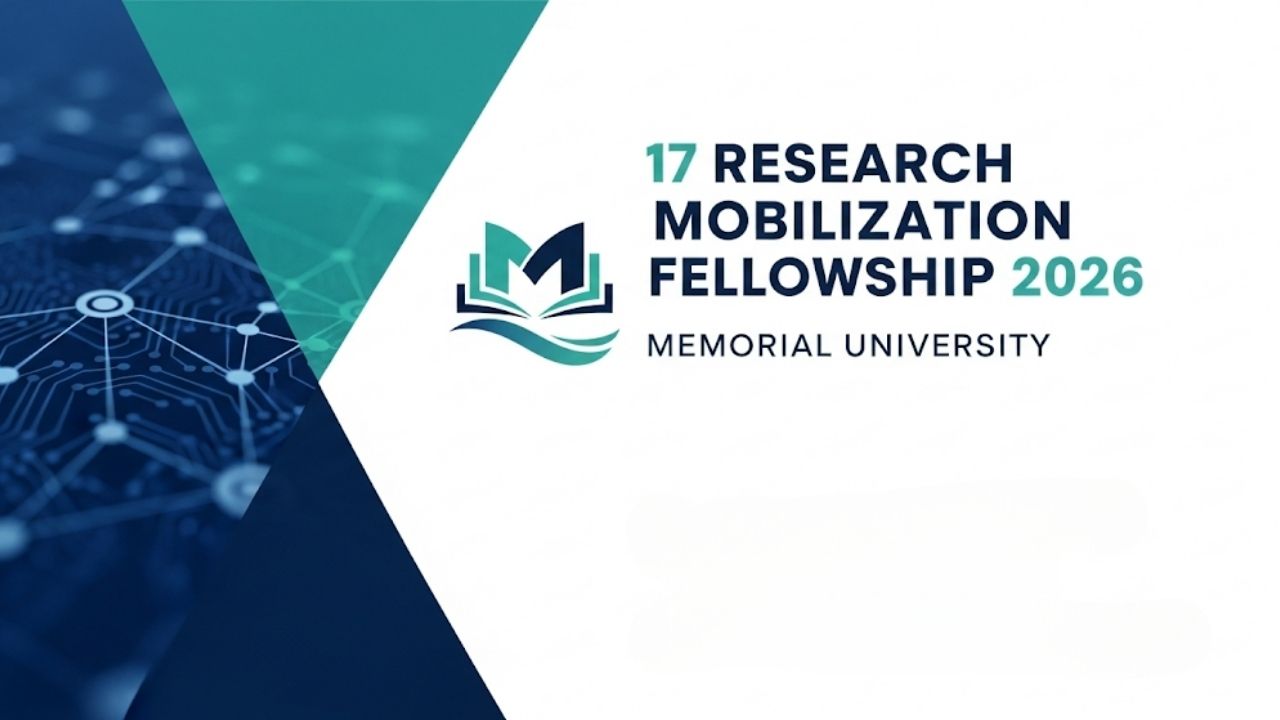Embarking on a PhD is a monumental step, and securing a fully funded position in a world-leading research environment is the ultimate goal. If you’re a passionate neuroscience researcher, the 16 NAD PhD Fellowships 2025 in Denmark represent a golden opportunity to launch a high-impact career. This prestigious 4-year program, offered by the Neuroscience Academy Denmark (NAD), is designed to nurture the next generation of scientific leaders. This guide will walk you through everything you need to know—from the exceptional benefits to the step-by-step application process—to turn your dream of a PhD in Denmark into a reality.

In my experience advising aspiring doctoral candidates, the sheer number of opportunities can be overwhelming. What sets the NAD Fellowship apart is its unique structure and the incredible level of support it provides. It’s more than just funding; it’s a comprehensive career development program.
16 NAD PhD Fellowships 2025 in Denmark
| Key Fact | Detail/Statistic |
| Number of Fellowships | 16 fully funded positions |
| Application Deadline | August 11, 2025, 4:00 PM (CEST) |
| Program Start Date | January 1, 2026 |
| Funding | Fully funded (covers salary, tuition, and research expenses) |
| Duration | 4 years (1-year pre-PhD + 3-year PhD) |
The 16 NAD PhD Fellowships 2025 in Denmark offer a truly exceptional pathway into a successful research career. With its unique blend of structured training and academic freedom, comprehensive funding, and access to a vast network of leading scientists, this program is an investment in your future.
The application process is competitive, but with careful preparation and a genuine passion for neuroscience, you can put forward a compelling case. Start gathering your documents, refine your research interests, and prepare to take the next big step in your academic journey. This is your chance to contribute to groundbreaking science in one of the world’s most innovative and welcoming countries.
What Makes the NAD PhD Fellowship in Denmark Unique?
The NAD PhD program isn’t your standard doctoral fellowship. It’s an immersive, four-year journey designed to give you unparalleled training and freedom. Funded by the Lundbeck Foundation, this national collaboration unites Denmark’s top universities: Aalborg University, Aarhus University, the University of Copenhagen, and the University of Southern Denmark.
Here’s why this opportunity stands out:
- A Tailored Pre-PhD Year: The program kicks off with a one-year pre-PhD period. During this time, you’ll undertake three lab rotations across different NAD-affiliated labs. This gives you the rare chance to explore various research environments and techniques before committing to a specific project and supervisor.
- Design Your Own PhD Project: Following the rotation year, you’ll have the autonomy to develop your own three-year PhD project in collaboration with the supervisor of your choice. This freedom to pursue your own research interests is a cornerstone of the program.
- Comprehensive Financial Support: Successful applicants receive a fully funded position. This includes a competitive salary, a waiver of all tuition fees, and a budget for your research expenses. This allows you to focus entirely on your work without financial stress.
- Access to a World-Class Network: With over 200 neuroscience laboratories participating, you’ll become part of a vibrant and extensive research community. The program includes specialized neuroscience workshops, academic retreats, and networking events to foster collaboration and growth.

Are You Eligible for This PhD in Denmark for International Students?
The NAD Fellowship is highly competitive and seeks candidates with a strong drive and a clear passion for neuroscience. While the program welcomes applicants from around the globe, there are specific criteria you’ll need to meet.
Core Eligibility Requirements
- Academic Background: You must hold or be in the process of completing a Master’s degree (equivalent to a Danish 120 ECTS Master’s) in a relevant field. This includes, but is not limited to:
- Neuroscience
- Medicine
- Molecular Biology
- Biomedical Sciences
- Neuroengineering
- Psychology (with a neuroscience focus)
- English Language Proficiency: As the program is conducted in English, you must demonstrate strong language skills. Accepted tests include the IELTS (minimum score of 6.5) or TOEFL paper-based test (minimum score of 560). Exemptions may apply if your Master’s degree was taught in English.
- Research Motivation: A genuine and well-articulated interest in neuroscience research is crucial. Your application should reflect a deep curiosity and a commitment to a research career.
Navigating the Application Process: A Step-by-Step Guide
A successful application requires careful planning and attention to detail. I’ve seen many excellent candidates stumble due to a rushed or incomplete submission. Here’s how to approach the process to maximize your chances of success.
Step 1: Gather Your Documents (Deadline: August 11, 2025)
Start preparing your application well in advance. You will need to submit the following documents through the official NAD online portal:
- Curriculum Vitae (CV): A maximum of two pages, with no photo. Highlight your academic achievements, research experience, and any relevant publications.
- Letters of Recommendation: The names and contact information of one to two references who can speak to your academic and research capabilities.
- Academic Transcripts: Certified copies of your Master’s and Bachelor’s diplomas and grade transcripts. These must be in the original language and accompanied by an official English translation.
- English Language Test Results: Your IELTS or TOEFL certificate, if applicable.
Step 2: The Online Application
The application must be submitted through the designated online portal on the NAD website. Ensure all fields are filled out correctly and that your documents are uploaded in the required format.
Here is an official announcement to keep an eye on for updates:
Step 3: The Interview Stage (September 2025)
After the application deadline, a selection committee will review all submissions. Shortlisted candidates will be invited for an online interview via Zoom in September 2025. This is your chance to discuss your motivation, research interests, and suitability for the program directly with the committee.
Step 4: The Final Decision (October 2025)
Final selections and job offers will be extended in October 2025. Successful candidates will then be formally employed and ready to start their exciting journey in Denmark.
Life in Denmark: An Exceptional Environment for Research and Living
Choosing to do your PhD in Denmark means more than just joining a top-tier research program. Denmark is consistently ranked as one of the happiest countries in the world, known for its high quality of life, excellent work-life balance, and safe, well-organized society.
As a PhD student, you are considered an employee and will receive a salary that allows for a comfortable standard of living. The Danish “hygge” culture, which emphasizes coziness and contentment, creates a welcoming atmosphere for international students and researchers.

Experience the vibrant student life in Denmark through posts like this:
Royal Society Wolfson Fellowship 2025: Eligibility and Step by Step Apply Process
FAQs
What are the research areas for the 16 NAD PhD Fellowships 2025?
The fellowships cover a broad range of neuroscience fields, including but not limited to Cognitive Neuroscience, Neurobiology, Biomedical Sciences, Neuroengineering, Molecular Biology,1 and Psychology with a neuroscience focus. The program encourages interdisciplinary projects.
Is prior research experience mandatory to apply?
While not explicitly stated as a mandatory requirement, strong evidence of research interest and experience (e.g., through a Master’s thesis, lab work, or publications) will significantly strengthen your application.
Can I apply if I haven’t finished my Master’s degree yet?
Yes, you can apply if you are in the final year of your Master’s program. You will need to provide a recent transcript of records or a written statement from your institution or supervisor confirming your expected graduation date. Your enrollment in the PhD program is contingent upon the successful completion of your Master’s degree.
Are there any age restrictions for applicants?
The official guidelines do not specify an age limit. The primary focus is on your academic qualifications, research potential, and motivation.










